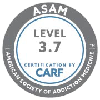Originally heralded as a medical marvel in the mid-20th century, benzodiazepines are sedative-hypnotic drugs. They are mostly prescribed to treat anxiety, insomnia, seizures, and muscle tension.
And you have probably heard of the drugs in this family. They include Valium, Xanax, and Ativan—household names for the most part. Their appeal lies in their ability to enhance the effect of the neurotransmitter gamma-aminobutyric acid (GABA) in the brain, producing calming and sedative effects.
From Relief to Dependence: A Subtle Shift
However, the journey from therapeutic use to addiction can be deceptive. When taken regularly, even as prescribed, the brain begins to rely on these drugs to maintain a sense of calm. This budding reliance, often mistaken as merely therapeutic need, can grow into a full-fledged addiction.
Many individuals might escalate their dosage due to the development of tolerance, where more of the drug is needed to achieve the same effect. Others might misuse it for its euphoric effects or in combination with other substances, further blurring the line between legitimate use and addiction.
The Reality of Benzo Addiction
Although it’s challenging to pinpoint an exact number of people with a benzo addiction, alarming statistics from the National Institute on Drug Abuse suggest that in 2019, over 16 million Americans reported using benzodiazepines. Among these, a significant portion is likely misusing them, leading to addiction.
Signs of Benzo Addiction
Detecting benzo addiction isn’t always straightforward. However, certain signs can act as red flags:
- Increased Dosage: A consistent need to increase the dose to achieve the same effect.
- Obsession: An excessive preoccupation with obtaining, using, and recovering from the drug.
- Neglected Responsibilities: Abandoning personal and professional obligations or hobbies.
- Withdrawal Symptoms: Experiencing anxiety, insomnia, tremors, or even seizures when trying to reduce or stop usage.
- Failed Attempts to Quit: Multiple unsuccessful efforts to cut down or control use.
- Social Isolation: Withdrawing from social scenarios or using the drug in secret.
With prolonged use, the body becomes accustomed to the drug’s presence, leading to dependence. When one attempts to quit or reduce consumption, benzo withdrawals manifest, a formidable adversary in the path to sobriety.

Benzo Withdrawals
Benzo withdrawals are not merely an anecdotal challenge; they’re real. The symptoms range from mild anxiety and insomnia to more severe like hallucinations and seizures. A survey by the Substance Abuse and Mental Health Services Administration (SAMHSA) revealed:
- Among the individuals seeking treatment, about 35% exhibited severe withdrawal symptoms, further cementing the critical need for supervised benzo detox.
The weight of these numbers paints a vivid picture, underscoring the gravity of benzo dependence and the imperative need for a structured detox approach.
Deeper Look at Benzo Detox
The benzo detox process, in its essence, is a procedure to purge the drug from one’s body while simultaneously managing withdrawal symptoms. However, it isn’t as straightforward as it may seem.
- Medical Supervision: A benzo detox without professional guidance can actually be dangerous. Abruptly stopping benzodiazepines can lead to severe withdrawal symptoms, even seizures. Under medical supervision, the dosage is often gradually reduced—a method termed ‘tapering.’ This approach minimizes the intensity of withdrawals and ensures patient safety.
- Addressing Psychological Components: Physical dependence is just one part of the equation. Psychological dependence plays a role too. Comprehensive benzo detox programs will include therapies like Cognitive Behavioral Therapy (CBT) and counseling to address underlying emotional and mental triggers.
- Nutritional Guidance: Diet plays a crucial role during detox. Proper nutrition aids in healing the body and boosting mood, helping to combat the lethargy and depression that often accompany benzo withdrawals.
- Holistic Therapies: Many treatment centers incorporate holistic therapies like yoga, meditation, and acupuncture to alleviate withdrawal symptoms and enhance overall well-being.

Saddleback Recovery Specializes in Benzo Detox
If the stories of benzodiazepines have resonated with you, remember, every book has multiple chapters. Saddleback Recovery in Costa Mesa, CA, stands as a testament to the transformative power of timely intervention.
At Saddleback Recovery, a dedicated team is read to help. Whether you’re dealing with the chains of benzodiazepines, alcohol, or any other substance, it’s time to reclaim your narrative.
Call today: (877) 843-5724.








